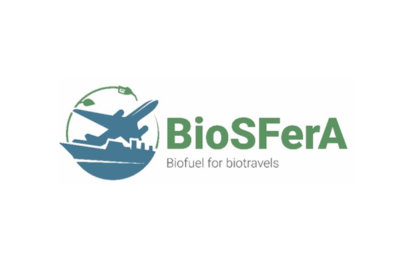BIOfuels production from Syngas FERmentation for Aviation and maritime use
BioSFerA aims to develop a cost-effective interdisciplinary technology to produce sustainable aviation and maritime fuels. Thus, biogenic residues and wastes will be gasified and the syngas will be fermented to produce bio-based triacylglycerides (TAGs). Bio-fuels will be produced via TAG hydrotreatment. The overall process, combining thermochemical, biological and thermocatalytic parts is based on the gasification of biomass and other biogenic waste in a Dual Fluidized Bed gasifier and the 2-stage fermentation of the produced syngas. Through this process the syngas is converted to acetate (1st stage) and then the acetate is converted to TAGs (2nd stage). The produced TAGs contained medium and long fatty acids are hydrotreated and isomerized after the necessary separation and purification and the end-products are jet- and bunker-like biofuels, respectively.
BioSFerA aims to evolve the proposed technology from TRL3 to TRL5. In the TRL3 phase, extensive lab scale tests will take place in order to optimize the process and increase its feedstock flexibility in terms of non-food bio-based blends. The best acetogenic bacterial strain will be identified based on its tolerance to syngas contaminants. Moreover, oleaginous yeasts will be genetically modified to convert the acetate derived from the first stage into C14 and C16-18 TAGs. Then, building upon lab tests, the pilot scale runs (TRL5) will investigate the overall process. At least two barrels of Hydrotreated TAGs will be produced as drop-in biofuels for aviation and marine. By exploiting the synergies between biological and thermochemical technologies, BioSFerA achieves a total carbon utilization above 35% and a minimum selling price <0.7-0.8 €/l. A process model of the overall BioSFerA process will be developed exploiting the know-how gained during piloting and used for realistic up-scaling calculations. Finally, techno-economic, market, environmental social and health and safety risk assessments will be performed.
ACTIVITIES of the Bio Base Europe Pilot Plant
BBEPP is responsible for the scale-up of the gas fermentation process from CO/CO2/H2 to acetic acid, as well as the subsequent fermentative conversion of acetic acid to TAGs, bringing the optimized fermentation process to TRL 5. This includes:
- Design and validation of the microbial conversion of CO2/CO/H2 to acetic acid
- Assessment of the influence of process parameters and contaminants on the gas fermentation process
- Optimization of the production of TAGs from the obtained acetic acid at pilot scale
- Demonstration of the gas fermentation on site of the syngas producer by using a mobile unit containing all required apparatus
- Scale-up conversion of acetate to TAGs and downstream purification strategy using industrially relevant and scalable equipment
- Collect and provide process data to the downstream partners for a techno-economic and life cycle assessment
PARTNERS
- Center for Research and Technology Hellas (CERTH), GR – Coordinator
- VTT, Finland
- Fundacion CARTIF, ES
- Bio Base Europe Pilot Plant, BE
- CSIC, ES
- Kuwait Petroleum Research & Technology (Q8 Research), NL
- RINA Consulting SpA, IT
- Sumitomo SHI FW Energia oy, FI
- Goodfuels, NL
- National Technical University of Athens (NTUA), GR
- ENVIPARK, IT
SUPPORTED by:
This project has received funding from the European Union’s Horizon 2020 research innovation programme under Grant Agreement number: 884208.



 webdesign
webdesign